June 28, 2011
The Curious Class
The year is 1904 and James Arbuthnot Fisher had reached the absolute pinnacle of his career. After fifty years in his chosen profession, he was arguably the most powerful man in the world. You see, James Arbuthnot Fisher was better known as "Admiral of the Fleet Sir Jackie Fisher, First Sea Lord." As such, he was
the commander of the British Royal Navy, the strongest military force under the sun, answerable only to His Royal Highness, King Edward VII.
In the past, Admiral Fisher had shown two interesting traits: an innovative mind, and a love for anything
fast. Some 10 years earlier, he had essentially created the class of ship we now know as the destroyer. Now he had the power to push through his greatest idea yet: a battleship armed with nothing but one size of large-caliber guns. She was to be named HMS
Dreadnought, and her very existence made the rest of the world's battleships obsolete at a single stroke. Obviously well-armed, well-armored, and (of course) fast for her time, the
Dreadnought was a marvel.
And then he had to go and create a companion for the
Dreadnought design. The concept was a good one: a ship able to chase down and kill commerce raiders in independent action, and able to act as the eyes of the battleline in a fleet action. It was to be able to outfight anything it could outrun, and outrun anything it
couldn't outfight. To do this required two things: high speed, and high firepower... a tall order, even for today's technology.
For the early 1900s, there was only one solution... take away weight. In essence, what Admiral Fisher wanted was to build a
Dreadnought-class ship, but without all that pesky armor. And, being First Sea Lord of His Majesty's Royal Navy, what Admiral Fisher wanted, Admiral Fisher got. What he got was the HMS
Invincible, the world's first battlecruiser.
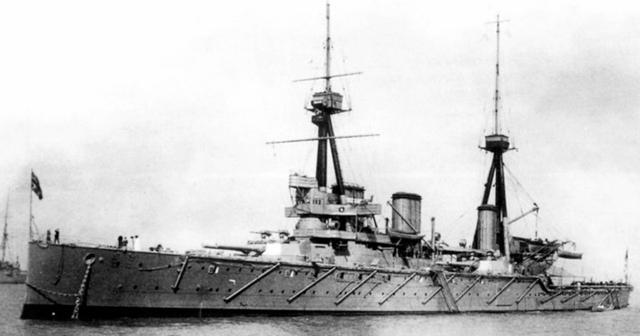
Weighing the same as the
Dreadnought within a couple hundred tons, the
Invincible carried eight 12" rifles in four twin turrets. While this was two guns fewer than the
Dreadnought, better positioning of the two wing turrets allowed them to fire to their opposite side. As a result, she could fire the same strength broadside as the bigger ship, which had only six guns on the center, and two wing turrets that could only fire to their respective sides. The
Invincible had 31 boilers driving four turbine-powered shafts, generating anywhere from 41000 to 46000 shaft horsepower, nearly twice the shp of the
Dreadnought. As a result, the
Invincible could make 25kts, and nearly reached 27kts during builder's trials. Her larger cousin could only make 21kts. But all that speed came at a dramatic cost.
more...
Posted by: Wonderduck at
11:08 PM
| Comments (17)
| Add Comment
Post contains 2317 words, total size 18 kb.
1
Considering the cost of a full battleship, were battlecruisers better than the cost-equivalent number of other, lesser warships, if that's all you could afford?
Posted by: Siergen at June 29, 2011 05:00 PM (RRRYd)
2
No. In fact, the
Dreadnought cost £1.67million,
Invincible £1.7million. The increased size of their powerplants (engine rooms, boilers, etc etc etc) outweighed the savings in price of armor by a far sight. At the time, the RN didn't include the cost of the guns in a ship's final price, but the two ships were basically armed the same in any case.
Posted by: Wonderduck at June 29, 2011 05:15 PM (6nDnY)
3
It sounds like the battlecruiser captains (or their superiors) didn't heed the "outrun anything it couldn't outfight" part.
Posted by: Kayle at June 29, 2011 07:44 PM (gpi2V)
4
Kayle, it's not that straightforward. The critical part of the Battle of Jutland was fought in fog, and there was no radar at that time. By the time the battlecruisers were aware that they were within gunnery range of enemy battleships, it was too late to escape.
In the case of HMS Hood, it was hunting Bismarck. But Bismarck's guns ranged Hood's guns. (Hood's guns had a maximum range of 32,500 yards. Bismarck's max range was almost 39,000 yards.)
Also, it was a do-or-die situation; the Bismarck had to be destroyed no matter the cost. If it successfully escaped and reached the coast of France, it would have been a mortal threat to the UK's supply lines across the Atlantic. In addition to losing Hood, the British took substantial damage to HMS Prince of Wales.
Posted by: Steven Den Beste at June 29, 2011 08:06 PM (+rSRq)
5
IMHO the UK Battlecruisers get a
bit of a bum rap.
The big problem was chemistry. The UKs cordite was not particularly stable. The Battleships HMS Bulwark and HMSVanguard and the Armored Cruiser HMS Natal were all lost to spontaneous magazine explosions
at the pier, a rather more benign environment than battle. The Japanese navy, which used UK pattern cordite, also lost 2 BBs and a cruiser to spontaneous pier-side detonation, and had a third ( the Mikasa) gravely damaged.
The 3 BC losses at Jutland were all a result of turret hits causing fires, explosions and general mayhem in the ammunition system. All might well have survived if not for the cordite issue.
Invincible herself gave a very good performance during the war clobbering Scharnhorst and is generally credited with sinking Lutzow (Lutzow received hits from other ships but they all caused minor damage. She never recovered from the pasting Invincible gave her in the moments before the British ship blew up).
While they were lightly armored in comparison with Battleships, the Invincible Class was actually better armored than the preceding
armored cruisers.
The problem was that above about 20 kts the power
increase required for an increase in speed starts to go up and gets
exponential eventuslly, so to maintain a 5 kt speed advantage over the
BBs the costs got excessive.
..so you ended up with a ship that was a bit faster, but less well armed and armored and cost
more and so was really too expensive to use on normal cruiser duties. This doesn't compute.
Posted by: Brickmuppet at June 29, 2011 08:32 PM (EJaOX)
6
Another problem the BC had was that the "run from anything bigger" concept assumes that said bigger ship won't manage to hit you before you got out of range. As demonstrated, one good volley from a BB was all it took. And the gunnery of front line ships at the time was getting much better, very quickly. Also of course, a BC can chase down cruisers, run from battleships, but it hosed if it runs up against another BC, especially if it encounters one with superior gunnery.
Posted by: David at June 29, 2011 08:57 PM (Kn54v)
7
How do you classify the Kirov class? NATO classified it as a battlecruiser, but apparently the USSR called it a heavy cruiser. I've also heard good arguments that despite the fact that we call them guided missile destroyers, an Arleigh Burke could better be described as a battlecruiser.
Posted by: David at June 29, 2011 08:59 PM (Kn54v)
8
Muppet, the
Minotaur-class, the last RN armored cruiser and contemporary of the
Invincibles, was armored almost exactly the same as the battlecruisers.
Main armor belt: 3"-6" for
Minotaur, 4"-6" for
Invincible. Deck armor: 1.5"-2" for
Minotaur, 1.5"-2.5" for
Invincible. Both had 7" of armor for the barbettes, and while the
Invincible had 7" of armor for her turrets, the
Minotaur had 8" on her heaviest guns. The armored cruiser's citadel was actually
better armored.
While the cordite
was a problem, the bigger problem was that the battlecruiser's turret armor was made out of wet toilet paper, therefore making it MUCH easier for said cordite to go kablammo.
Kayle, the British battlecruisers at Jutland ran up against something they could neither outrun or outfight: the GERMAN battlecruisers. Just as fast, nearly as heavily armed, and better armored... exactly NOT what Admiral Fisher wanted them to butt up against. That the situation really didn't allow them to run away is a moot point.
David, I knew someone would bring up the
Kirov. The correct terminology for the
Kirovs would be "Heavy Nuclear-powered Missile Cruiser." It was called a battlecruiser because... well... it wasn't a battleship, and it was far more potent than a cruiser. Heck, other than carriers, it probably the most powerful warship ever put to sea... and yes, that includes the modernized
Iowas, too.
As far as how the US Navy currently designates their surface combatants, it's totally screwed up in relation to the WWII system. The
Arleigh Burkes, using WWII designation systems, would probably be termed a CLAA (Light Cruiser, Anti-Aircraft), as that's its main mission. The now-retired
Spruance-class DD would be a CA, and the
Ticonderogas... well, they don't fit, as there was no CAAA.
Posted by: Wonderduck at June 29, 2011 09:24 PM (6nDnY)
9
The Minotaurs were good ships but ISTR reading the I's armor was actually more extensive. That is those thicknesses were carried over a larger area.
Posted by: Brickmuppet at June 29, 2011 09:43 PM (EJaOX)
10
Sanity check: "It was to be able to outfight anything it could outrun, and outrun anything it couldn't outfight."
Posted by: Logic break at July 01, 2011 05:07 AM (TPN3N)
11
"They could outrun anything they couldn't outfight" is something that was said of the American super-frigates in the first half of the 19th century.
Posted by: Steven Den Beste at July 01, 2011 06:17 PM (+rSRq)
12
No, technically
Brickmuppet Logic break is correct. Pedantic, but correct. But I don't care, the sentence is fine, the reader (as opposed to the nitpicker) understands it.
Posted by: Wonderduck at July 01, 2011 08:53 PM (ZGINl)
13
Pardon the pedantry, but that's "His Majesty King Edward VII."
Incidentally, my grandfather served in Minotaur at Jutland, in Tiger (improved half-sister of Lion) in the 20s and in Courageous in the mid-30s, after her conversion to an aircraft carrier.
Posted by: EdwardM at July 05, 2011 12:54 AM (Om4/O)
14
Tiger, when launched, was the fastest capital ship in the world, capable of thirty knots, and also one of the last to use coal-fired engines rather than oil. When my grandfather was in her, just before she was decommissioned pursuant to Washington, she was being used to trial experimental gunnery equipment. Her captain was a member of the Dewar distilling family, but was himself a teetotaller; he pronounced his surname "de War".
Posted by: EdwardM at July 05, 2011 06:12 PM (XjCFQ)
15
Another lovely excursion into nautical history, Mr Duck. Thanks.
BTW - was the Mutsu also a cordite victim? I had read somewhere that it was the victim of a peculiar AA shell fashioned for her main guns....
Posted by: The Old Man at July 06, 2011 10:12 AM (TcNy+)
16
Would you believe that the
Mutsu was probably destroyed by a suicidal crewman?
Posted by: Wonderduck at July 06, 2011 06:51 PM (3tp4g)
17
A bit late to the party, but I should mention that a big problem with British BCs blowing up to shell hits was the fact that since the Battle Cruiser Force made a high rate of fire king, the British BCs tended to leave everything else secondary, including ammunition safety. This reached the logical conclusion where they removed even the rudimentary flash-protection they had because it interfered with their ammo feeds - which might have saved 2 BCs at Jutland.
Of course, a high rate of fire would have been nice if the BCF actually shot accurately in the process - which apparently only QUEEN MARY (The 1st BC sunk.) did so consistently....
And if you think the US Navy's current ship designation system is bizarre, how about the system the USN had between WW2 and the mid-1970s?
C.T.
Posted by: cxt217 at July 09, 2011 06:03 PM (M5HQo)
Hide Comments
| Add Comment
June 25, 2011
Saturday Night Tunage III
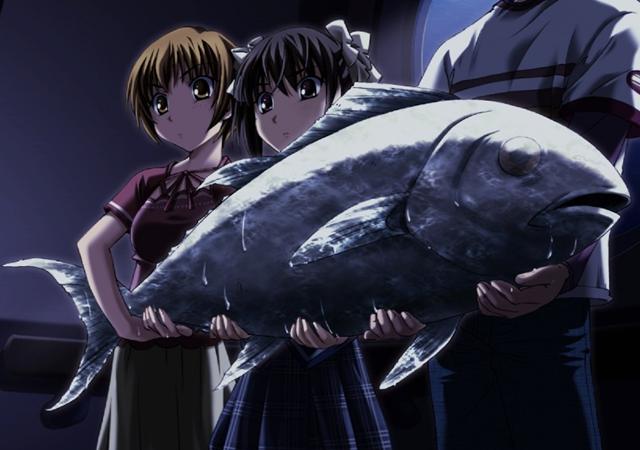
You've waited all week, and now it's finally here! DJ Wonderduck is back with the third installment of Saturday Night Tunage, music to either get you in the mood for whatever event you have planned on this first full day of the weekend, or to provide you with a soundtrack for the evening!
But enough of me jabbering away, let's get on with the tunage! Maestro, if you please...?
more...
Posted by: Wonderduck at
07:45 PM
| Comments (5)
| Add Comment
Post contains 590 words, total size 5 kb.
1
Your fixation on tuna-related matters lately is a bit odd, and out-of-character. One might almost say there's something fishy going on...
Posted by: Siergen at June 25, 2011 09:50 PM (ZlSUX)
2
Well, most of the time around here it's toon-age, no?
Posted by: Avatar_exADV at June 25, 2011 10:43 PM (mRjOr)
3
Very nice lineup this week, sir! I
love the Tron Legacy soundtrack, particularly "Derezzed" (the remix is fantastic). As a die-hard PSB fan I had to pick up Electronic when it came out (and was slightly disappointed that Neil Tennant is only on a couple of tracks); they also released a single for a movie, I think it may have been Cool World, called "Disappointed." And Elfen Lied... hoo boy. Not my cuppa, normally, but I slogged through it and agree that it's a great series... that I never really want to watch again.
Posted by: GreyDuck at June 26, 2011 08:31 AM (7lMXI)
4
3AM Eternal, at least, was all over the radio in that hippest of hip places, North Dakota.
So that KLF album was the first CD I ever purchased. Not the first album, though... I was a cassette-tape-and-boom-box era pre-teen. I don't recall what my first tape purchase was. (They say the memory is the 2nd thing to go...)
Some Sunday afternoon tunage, perhaps? Travel, by The Gathering.
I did the RealAudio-pirate-radio-DJ thing for a few years, back when that sample in the opening of Travel meant something. So it's hard not to drop song links in discussions like this...
Posted by: Mikeski at June 26, 2011 11:20 AM (GbSQF)
5
GD,
Disappointed was Electronic's biggest hit (6th on the UK charts), as well as being on the
Cool World soundtrack. That being said, I don't like it nearly as much as
Getting Away With It.
Mikeski, now that I've listened to your linked tune, I feel like staring at my shoes in despair.
Posted by: Wonderduck at June 26, 2011 12:24 PM (n0k6M)
Hide Comments
| Add Comment
June 23, 2011
Name This Mystery Ship VI
While we wait for my brain to function long enough to complete the battlecruiser post, I figured I'd give you folks a treat... another Mystery Ship contest! Here's tonight's contestant:
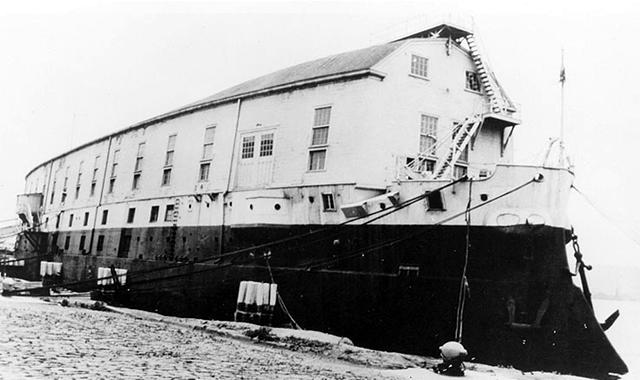
Name the ship, win a post! Operators are not standing by to take your call.
Posted by: Wonderduck at
10:41 PM
| Comments (8)
| Add Comment
Post contains 50 words, total size 1 kb.
1
Arrgh! Why did you post this so late on a weeknight? I have work tomorrow!

Other than what appears to be a workshop or offices built on top of a pre-Dreadnaught battleship or cruiser, I've got naught so far...
Posted by: Siergen at June 23, 2011 11:27 PM (/P7QN)
2
The best I can come up with the USS Kearsage or Kentucky after conversion to a barracks or receiving ship. I can't find any photos or write-ups for this, but several bow details seem to match.
And now, a few hours sleep before I need to go to work....
Posted by: Siergen at June 23, 2011 11:49 PM (/P7QN)
3
The bow looks like WWI.
I assume that the part at the rear that sticks out on the side is a latrine, right?
Posted by: Steven Den Beste at June 23, 2011 11:52 PM (+rSRq)
4
USS Prairie State (IX-15), better known as USS Illinois (BB-7).
Posted by: flatdarkmars at June 24, 2011 01:39 AM (zxqxC)
5
flatdarkmars does it again. Name your post, sir, or should I just do another one as usual?
Posted by: Wonderduck at June 24, 2011 06:24 AM (n0k6M)
6
Why did they feel the need to leave all that steel buried underneath an office building for thirty years? Couldn't they have used all that armor-quality steel in some more productive fashion?
Posted by: Mitch H. at June 24, 2011 09:31 AM (jwKxK)
7
Mitch, that's simple: it's not an office building. After the USS Illinois was changed to the Prairie State, she was also converted to become an armory ship.
That armor is, presumably, containing cordite, shell and shot by the thousands of tons. It probably wouldn't do much good if it all went up, but it's likely better than nothing.
Posted by: Wonderduck at June 24, 2011 09:53 AM (OS+Cr)
8
Hmmm your topic is... something to do with German surface commerce raiders in either the 1st or 2nd World War... I'll leave it fairly non-specific so you have some latitude to pick something interesting.
Posted by: flatdarkmars at June 24, 2011 12:13 PM (zxqxC)
Hide Comments
| Add Comment
June 21, 2011
A Plan Derailed
I have a post in the works about battlecruisers, but it's proving to be a lot more complicated than I expected. Throw in the severe thunderstorms that have been dodging around Duckford for the past couple of hours, and I've been flummoxed at every turn.
Don't worry, however... it's coming soon. These two'll make sure of it.

Yup. I'm scared, I am. Eek.
Posted by: Wonderduck at
08:40 PM
| Comments (2)
| Add Comment
Post contains 66 words, total size 1 kb.
1
Is "derailed" the right metaphor for a plan involving ships? How about "struck a reef"...
Posted by: Siergen at June 22, 2011 08:35 PM (/P7QN)
2
You Da Man, Duckie. Willing to await your erudition.
BTW - didn't blow off your e-mail - have to dig through records to find the number of my dad's LST. He was in "the black gang" (his words) though...
Posted by: The Old Man at June 23, 2011 11:06 AM (TcNy+)
Hide Comments
| Add Comment
June 18, 2011
Saturday Night Tunage II
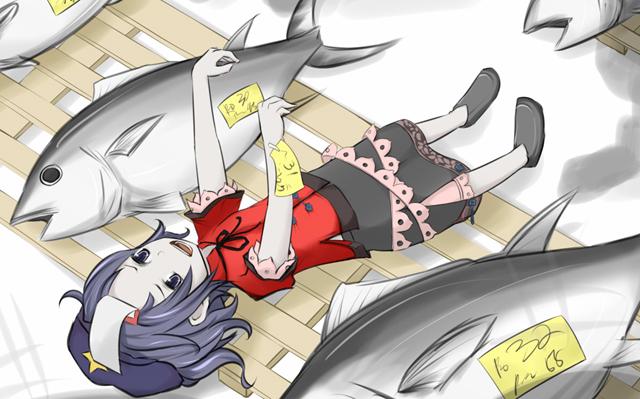
As the motivation to write anything in-depth and interesting seems to have departed my body as of right now, I've decided to do another Saturday Night Tunage post! Come, be amazed at my myriad musical tastes!
more...
Posted by: Wonderduck at
10:42 PM
| Comments (16)
| Add Comment
Post contains 706 words, total size 6 kb.
1
So, have any anime theme songs or sound tracks tickled your fancy?
Posted by: Siergen at June 18, 2011 11:40 PM (PvrXx)
2
Nothing recent, Siergen, other than
Magia. The
Angel Beats soundtracks are great fun, though. For example, three different versions of "Crow Song", all of them good in their own ways.
Posted by: Wonderduck at June 18, 2011 11:56 PM (n0k6M)
3
Ummm...that picture...is there context?
Posted by: Brickmuppet at June 19, 2011 01:01 PM (EJaOX)
4
I have to agree; that picture is really creepy. I'll be glad when you make another couple of posts.
Posted by: Steven Den Beste at June 19, 2011 05:58 PM (+rSRq)
5
A dead girl laid out as the "catch of the day"? After his mind was broken by reviewing
Rio, I suppose this sort of thing was inevitable...
Posted by: Siergen at June 19, 2011 06:28 PM (PvrXx)
6
Not dead, she's got one of those spirit-sealing Tao scroll thingies on her forehead. Don't recognise her though.
Posted by: Pixy Misa at June 19, 2011 07:20 PM (2yngH)
7
Doesn't that spirit sealing thing mean she is dead but has been reanimated pending developments in medical technology or plot?
Posted by: Brickmuppet at June 19, 2011 09:08 PM (EJaOX)
Posted by: bouff at June 19, 2011 09:55 PM (GhfbT)
9
What I've found is that she's a minor character from the
Touhou franchise named Miyako Yoshika. No less a person than TheBigN himself posted the original picture to Danbooru, so perhaps he can shed some light on the subject... let me see what I can do to summon hisownbadself...
Posted by: Wonderduck at June 19, 2011 10:19 PM (n0k6M)
10
I looked her up.
She's a severely disabled girl (dead actually) who is trying to hold down a security job despite her handicap.
So, as we feared, Wonderduck has posted a picture of a dead girl being sold at the fish and long pork outlet.
Posted by: Brickmuppet at June 20, 2011 10:10 AM (EJaOX)
11
So you just have to look at it the other way. It's not a dead girl amongst dead fish to be used as food, it's actually zombie fish and a zombie girl being sold as bodyguards.
I think the fish will require some frickin' laser beams on their frickin' heads to be any good at the job, though.
Posted by: Mikeski at June 20, 2011 01:53 PM (GbSQF)
12
On the comments for that picture on danbooru, one person actually notes that one of the Yoshika's nicknames as attributed by some fans is "Maguro-chan", which references
bed habits apparently.
Posted by: TheBigN at June 20, 2011 02:46 PM (k33Ji)
13
What is it with Touhou and Chinese girls as ineffective security guards?
At any rate, thanks for the music - I was stuck at work on Saturday night and it helped a lot.
Posted by: Avatar_exADV at June 20, 2011 03:35 PM (pWQz4)
14
So, as we feared, Wonderduck has posted a picture of a dead girl being sold at the fish and long pork outlet.
Wonderduck's mental condition is worse than I feared. Quick, someone recommend a decent anime series to him, before it's too late!
Posted by: Siergen at June 20, 2011 09:00 PM (PvrXx)
15
Coming back to this one a bit later...
It's funny: I was, at best, indifferent to the Foos before that AMV. (Fully deserving of its win, I hasten to add.) Now I'm... slightly more than lukewarm to them. I picked up "Echoes Silence Really Long Album Title Guys" and like a few tracks off of there, but I'll probably never be a huge fan. I can respect 'em a lot more, though.
Posted by: GreyDuck at June 21, 2011 09:28 PM (7lMXI)
16
Okay, dead-ish. Mostly dead. Possibly pining for the fjords.
Posted by: Pixy Misa at June 21, 2011 11:37 PM (2yngH)
Hide Comments
| Add Comment
June 16, 2011
Just A Little Duck

(...in response to
this)
Posted by: Wonderduck at
08:02 PM
| Comments (6)
| Add Comment
Post contains 8 words, total size 1 kb.
Posted by: ButMadNNW at June 16, 2011 08:59 PM (o8ylv)
2
Whoah. That's smaller than any of the ducks I have on staff.
Posted by: GreyDuck at June 16, 2011 11:19 PM (7lMXI)
3
Greyduck, or maybe it's just a really, really big hand? And you what they say about rubber-duck enthusiasts who have big hands...
Posted by: Siergen at June 17, 2011 10:40 AM (PvrXx)
4
"And you what they say about rubber-duck enthusiasts who have big hands..."
...they can get them all out of the bathtub real fast?
Posted by: Mikeski at June 17, 2011 02:55 PM (GbSQF)
5
I hope you get this little guy out of the tub before you pull the plug! Heehee. So cute

Posted by: Colleen at June 19, 2011 06:20 PM (y3twI)
6
Colleen, this is a rare rubber duck that isn't actually rubber... he's metal. Water is terrible for him... deep water doubly so.
Posted by: Wonderduck at June 19, 2011 10:29 PM (n0k6M)
Hide Comments
| Add Comment
June 11, 2011
Saturday Night Tunage
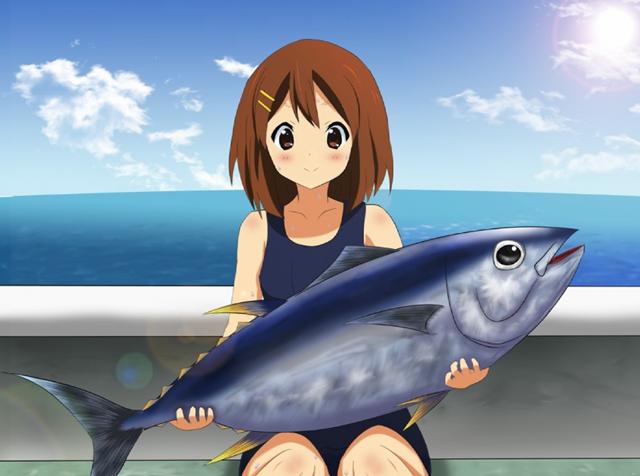
No, not "Saturday Night Tuna,"
tunage! I haven't done a good music post in a while, and since I don't want to work on the two long anime posts I've got on my mind, this would be a good time!
Click below for an... interesting... assortment of music!
more...
Posted by: Wonderduck at
10:09 PM
| Comments (1)
| Add Comment
Post contains 835 words, total size 8 kb.
1
You know you've been reading anime blogs too long when you see that headline and try to figure out why you don't know what "too-nah-geh" is.
Ooohhhhh...
Posted by: Mikeski at June 13, 2011 08:20 PM (GbSQF)
Hide Comments
| Add Comment
June 09, 2011
Misunderstanding Midway
Down in the comments section of the post "
The Reason for Midway", there's a sight to warm the heart of any blogger: an energetic
argument discussion. Longtime readers CXT and Avatar are doing a fine job of carrying the flag of disagreement with Bob, I wanted to pay closer attention to something he said at the very beginning of his comments. To whit:
"
These discussions are interesting but so narrow as to be misleading. The entire Midway exercise didn't matter, regardless of outcome."
It will come as no surprise to readers of The Pond that I vehemently disagree with this statement. To be honest, in one way I do agree with Bob in that Japan had no chance of winning an overall military victory against the forces of the United States, Britain, Australia and the Dutch. However, that does not mean that Midway didn't matter, any more than it means that Guadalcanal/the Solomon Islands, Leyte Gulf, Iwo Jima, Tarawa, or even Attu and Kiska, didn't matter.
Once the first A6M2s, D3A1s and B5N2s lifted off from the
Akagi,
Kaga,
Hiryu,
Soryu,
Shokaku and
Zuikaku on their way to Pearl Harbor on December 7th, 1941, sterile discussions over such concepts that Bob mooted became academic: win or lose, the die was cast and
everything mattered. Only in hindsight can we say "it was pointless and the Pacific War shouldn't have been started". The fact of the matter is that it
did start, men
did fight, and it
did matter... every bullet fired, every torpedo launched, every bomb dropped, every grenade thrown, mattered.
It mattered to 3400 men at Midway. 29000 men at Iwo Jima. 38000 men at Guadalcanal. 7000 men in the Aleutians. 12000 at Peleliu. And hundreds of thousands more at dozens of other locations across the Pacific.
To suggest that these battles "didn't matter", no matter how large the stack of scholarship one may bring to the table, is ridiculous and insulting to those who participated and survived, those who were there and were injured, and to those who fought and died on both sides. Don't take my word for it, however... walk up to a Pacific War veteran and tell
him his actions didn't matter. Just let me know where and when you intend to do it, so I can bring popcorn.
Regarding the first part of Bob's statement, it seems clear that he doesn't read The Pond overmuch. Very nearly by definition, I blog about "the narrow", because that's where my interests lie. Sure, I could write about the geopolitical situation surrounding the beginning of WWII in the Pacific, but I'd hate every moment of it. I'm an amateur historian of the military actions of the Pacific War, with an emphasis on naval battles, and a particular emphasis on the Battle of Midway, because
that's what I like... and I write about what I like. I won't apologize for being "too narrow" for someone's taste.
Particularly when it "doesn't matter".
Posted by: Wonderduck at
10:31 PM
| Comments (9)
| Add Comment
Post contains 495 words, total size 4 kb.
1
I'll
try again.
"...that
does not mean that Midway didn't matter, any more than it means that
Guadalcanal/the Solomon Islands, Leyte Gulf, Iwo Jima, Tarawa, or
even Attu and Kiska, didn't matter...." Of course it
mattered. But I believe the people in the steel mills in the
upper mid west, the Manhattan project folks in TN & NM, the
bomber assembly workers in KS & GA, etc also mattered and that
the collective efforts of the home front meant more to the wars
outcome than the clearly heroic efforts of the military at the 'tip
of the sword'.
What
would have happened if the USA lost at Midway? Lost the
Hawaiian Islands? Lost Australia?
There
might have even been fewer front line military deaths! I don't
know. But I do believe that any rational analysis would show a
defeated Japan before 1950. Maybe even before 1946.
There
is no likely case for getting Japan past Hawaii. Existing
submarine forces and the long supply line would have stopped the
Japanese for years at Hawaii. With Japanese actions on so many
fronts, they didn't have the ability to project to our west coast.
In the absolute worst case, the America of 1944 would have
looked about the same. More carrier fleets than Japan, more
submarines and so many long range bombers that the sky would
still go dark when they were overhead. Can you imagine a
carrier fleet being attacked by B-29's (who were protected by P51's)?
And in the worst case, how many nukes would it take to
eliminate the Japanese Navy in 1946/7? Would our 700 (worst
case) nuke inventory in 1950 been enough? The method and path
of winning was not known, that we would win was.
It
is NOT any lack of scholarship OR disrespect for the efforts of the
those on the front line in the Pacific. Both of my parents are
buried in Arlington and my father-in-law spent WWII on a destroyer in
the Pacific (a high risk place to be). It is a simple statement
of fact that was known THEN as well as now. The troops in the
Pacific got the best gear last and the old stuff first. Most of
the military and most of the equipment went to Europe. So did a
lot of the Navy. Our government knew then that Japan was going
to lose. That's why we 'starved' the Pacific war. Germany
was felt to be a much closer case. It wasn't 'hindsight' or
'academic', it was the thinking of the 1941 American
government/industrial complex.
The
only real issue is the one that says the Japanese had to do this and
made a reasonable gamble that an aggressive push against the US early
would get the US out of the war. A long war against a
determined, violent Japan would discourage the US and cause them to
sue for peace. History has made it very and unambiguously clear
that by 1941 the American government/industrial complex was already
gearing up for the long war and was looking full time for a way to
get into a war with Germany. The only questions that are
relevant are [1] Did Japan really have to go to war with the USA and
[2] if they did, would bold, aggressive early actions get the USA to
sue for peace?
So
I'm left with my same three conclusions:
[1]
Really bad staff work by the Japanese military planners
combined with a toxic command structure 'forced' Japan to conclusions
that were not based on an understanding of the American people or
readily available information about the war 'capacity' of the USA..
[2]
A Japanese 'peace at any price' policy might have worked but a
war with the USA would never have a Japan favorable outcome.
[3]
"These
discussions are interesting but so narrow as to be misleading.
The entire Midway exercise didn't matter, regardless of outcome."
Wonderduck:
"... I won't apologize for being "too narrow" for
someone's taste..." I came to the Pond via a thread I
noticed on Steven
Den Beste's
site. I noticed the 'narrowness' because there were several
different entries on Midway. I decided to comment because I
thought the conclusion was wrong and that a discussion would be
interesting. Nothing wrong with being narrow. No reason
to take the geopolitical big view. Midway was an interesting
battle for so many reasons. Midway was an excellent example of
the best of our military and people. Midway was tactically
significant and strategically significant to the military progression
across the Pacific.
But
it was NOT strategically important to the actual outcome of the war.
I thought the discussion on this site went a little too far on
the importance of the Midway battle. I note you have not been dissuaded
from your view and I haven't changed mine either. No change was
expected. The goal was an exchange of views and that has been
achieved. For me, very enjoyable.
Regards
to all.
Posted by: BobReisner at June 10, 2011 04:13 PM (/ZWI/)
2
You can't really come to that conclusion, however.
War weariness
did exist. It's easy to say "there were no circumstances under which the US would have accepted anything less than total victory and unconditional surrender", but that's plainly not true from contemporaneous records. This is one of the reasons we resorted to the atomic bomb; we anticipated a tremendous number of casualties in the invasion and we were worried that the public wouldn't support the war to a final conclusion.
Midway was extraordinarily costly for Japan. They lost the majority of their carrier fleet and carrier air arm in a single operation. Change the outcome to a Japanese victory, or even an inconclusive stalemate (say, the US carriers spot the battle fleet and work them over well instead of the Japanese carrier group), and the entire course of the war could have changed.
Does that mean the Japanese could have conquered Hawaii or Australia? Probably not. But having an experienced carrier group to contest several of the initial US invasions would absolutely have raised the casualty count and slowed down the US advance.
Sure, eventually we develop nuclear weapons. But we developed and deployed them at a time where we had virtually uncontested freedom to bomb the Japanese as we liked. But what if we hadn't gotten that far yet? If we were still working our way through the Philippines, if we hadn't taken the Marinaras? Even with nukes, our strategic outlook is quite different under those circumstances.
Would we have used nukes on otherwise-valueless islands to crush the Japanese resistance? You can make the case that we'd have done better turning Iwo Jima into a pile of radioactive glass, for example. You could even see the logic in nuking places like Rabaul or Truk, bases we didn't want to take on directly but didn't really need to occupy either. We might have ended up using as many as a few dozen nuclear weapons in the end, especially if you consider the chance of interception of the bomber, etc. That's a very different post-war Pacific.
Or would we resort to a Doolittle raid, with nukes? Surely we wouldn't have had the luxury to hit only one target, and it's not likely we'd have spared Tokyo under those circumstances.
Posted by: Avatar_exADV at June 10, 2011 07:40 PM (pWQz4)
3
To back what Avatar mentioned - as Richard Frank wrote in Downfall, there were people in the Administration whose job it was to monitor American sentiment and war weariness, among them Dean Acheson. And they were detecting signs that the US public was becoming war weary by 1945. It is a tribute to the Japanese's attack on Pearl Harbor it took that long to produce the effect, but the Administration was concerned that the Japanese strategy of 'outlasting' the US and the Allies in the Pacific War might actually had a chance of working. Or perhaps just as bad, the Japanese would conclude it was working and thus stiffen their resistence.
Furthermore, as David Evans and Mark Peattie had pointed out in Kaigun, it was primarily because of the Japanese 'sneak attack' on Pearl Harbor that produced the psychological and motivational attitude among the American public for a total war to the finish, with the unconditional surrender of the enemy as the objective. Had the war opened in a different fashion, perhaps by an attack on the Philippines following a formal declaration of war, it is highly unlikely that the US public would have been willing to fight for unconditional surrender - and more than likely that a large part of the American public would have called for immediate talks with the Japanese since the 'Philippines are not worth American blood!'
As for the assertion that the US government 'knew' the Japanese were going to lose - not quite. The US government felt Germany was a more dangerous opponent than Japan and hence needed to be defeated first, but no one ever assumed either of them were eventually going to 'lose'. We have the hindsight that says it is true - but nothing in the deliberation of both the US high command, or the debates among the Allied command suggest that until the end was in sight in either theater.
Posted by: cxt217 at June 10, 2011 08:08 PM (G3oVK)
4
Bob, you're always welcome back, but next time? PLEASE don't compose your comments in Word.
Now then... "I noticed the narrowness because there were several different entries on Midway." Yes, because that's what I'm interested in. You wouldn't criticize a NASCAR blog for not writing about French cuisine, would you? Of course not.
As far as the strategic importance of Midway goes, well, I've said ON THIS VERY BLOG that it wasn't the most important battle of the Pacific War, Guadalcanal was. But saying that it wasn't strategically important to the outcome of the war is just silly. If the results had been reversed, with the US losing three carriers and the IJN zero, (as opposed to 1 and 4 in reality), there's plenty of reason to believe the war would have taken much longer to prosecute. Japan would still have lost, but not until 1946 or 1947, and it would have taken quite a few more nukes in the process.
That's important.
Posted by: Wonderduck at June 10, 2011 08:09 PM (n0k6M)
Posted by: Wonderduck at June 10, 2011 08:17 PM (n0k6M)
6
There is a school of thought, both during the war and after it, that says D-Day and Normandy was an 'unnecessary' invasion - heck, the British kept pushing that idea until FDR let Stalin essentially shamed them into dropping it. Make that what you will.
And regarding Avatar's point - B-36 bombardment groups, from Hawaii.
Posted by: cxt217 at June 10, 2011 09:09 PM (G3oVK)
7
I'm not familiar with the B-36, I'm afraid.
I'd like to endorse
Downfall as well. It's the best work I've ever read on the end of the Pacific war by a long way.
Posted by: Avatar_exADV at June 10, 2011 09:13 PM (pWQz4)
8
To feed off of cxt217's comment, I've been reading a lot of histories of the Eastern Front, and saying the outcome there was pre-determined is also a bit of a mistake. A lot of the newer histories are drawing on previously-classified Soviet archives which indicate that through mid-1943 the situation was a lot more desperate than they were willing to let on, either at the time or in official Soviet post-war histories. By the time of the battle of Berlin, the Soviets were also reaching their limits, and their operations changed from the carefully planned Bagration-style offensives to more of a frenzied 'lets just get this over with and throw everything in' final assault.
Of course Stalin wanted the Western allies engaged against Germany to draw German forces away from the front, and was disappointed in the level of support he felt he was receiving. Even relatively minor distractions like Sicily had noticable cascading effects on German strength in the East.
Posted by: Civilis at June 10, 2011 10:22 PM (/+Ti8)
9
The B-36 Peacemaker was the first true intercontinental bomber, designed in 1941 when it was looking grim for Britain. It didn't fly until early August 1945, however. Roughly twice the size of a B-29, as designed it used six radial pusher engines. Eventually it also mounted four jets along with the radials. Good article about it
here.
I'll third the support for
Downfall, though there's a new book by DM Giangreco that I've heard good things about, entitled
Hell To Pay. Same topic as Frank's book, I've been wanting a copy for the past year or so...
Posted by: Wonderduck at June 10, 2011 10:32 PM (n0k6M)
Hide Comments
| Add Comment
June 05, 2011
Missing Midway Photography
Unless you're like me, and heaven help you if you are, you may not have noticed one of the most surprising facts surrounding the Battle of Midway. That is,
where are all the pictures of the Japanese carriers? Now, I can hear you saying "Wonderduck, there's plenty of pictures of
Kido Butai at Midway out there! Just look at this one of the
Akagi!"
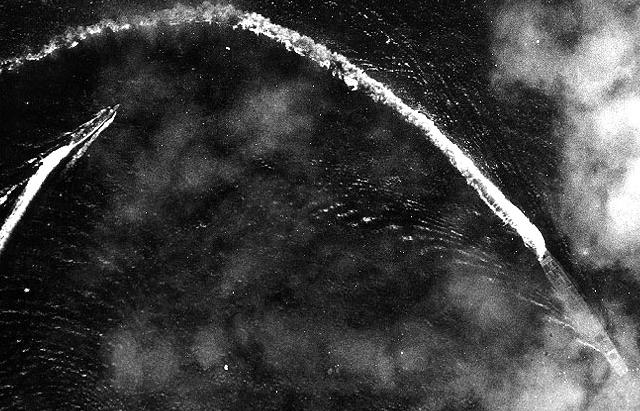
"Or this one of the
Soryu!"
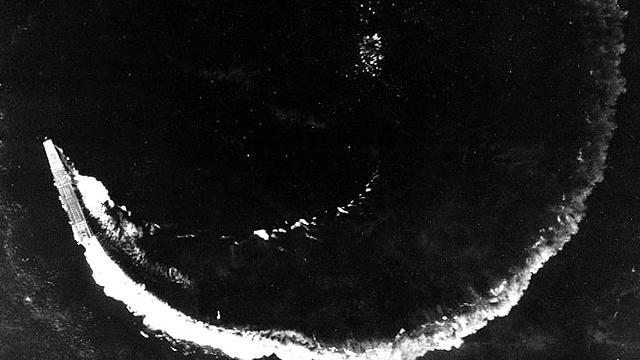
"Or this one, it's the
Hiryu!"
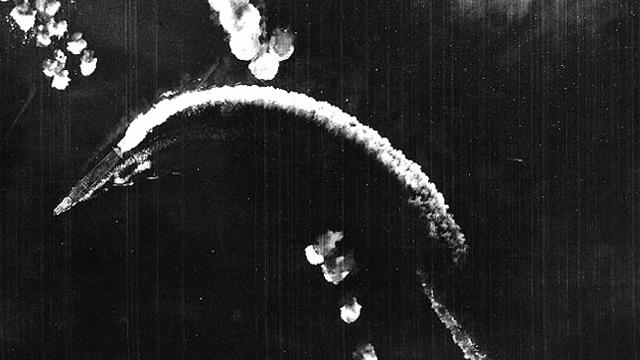
"Or this one, of the
Kaga... er... hey!"
I'm sure there are variants of the above three pictures in the National Archives, but for all intents and purposes, those are the only images of the Japanese carriers involved at the Battle of Midway that we have. Taken from B-17s on the morning of June 4th, 1942, they represent the entirety of the US photographic effort during the battle.
Or do they?
more...
Posted by: Wonderduck at
11:40 PM
| Comments (1)
| Add Comment
Post contains 911 words, total size 8 kb.
June 04, 2011
The Reason For Midway
Reader Siergen asks: "
Assuming that the Japanese had succeeded in taking Midway, did they have any plans to actually use it, such as for land-based bombing of Pearl harbor? Or was it intended solely as bait to lure the US carriers out and sink them?"
A fine question. Indeed, there was a strategic reason for the Japanese to take Midway. However, in my estimation, their reasoning was somewhat... flawed. As the War in the Pacific drew close, the Japanese military knew that they could not realistically go toe-to-toe with the United States for more than a year or so, two years maximum (let that sink in: they started a war they could not win militarily... and knew it). Instead, they intended to win politically, by inflicting such heavy losses on the US and her allies that they'd give up and go for a political settlement. In the political realm, they believed that they'd have a strong case for keeping their conquests (primarily the Indonesia area, with her rubber, tin and oil deposits) and become both self-sufficient and the unquestioned master of Asia.
To do this, the Japanese adopted a strategy that relied on the concept of a defensive perimeter. They figured that if they captured enough island bases, like Wake, Guam, Rabaul, and the Philippines, then improved them to stronghold status so they'd be impossible to re-take, they'd be able to create an impassible border that would keep the Japanese Home Islands secure. Along the way, they'd also attempt to sever the lines of communication between Australia and the US, though that would be more of a bonus than a goal. It's hard to imagine the strategy without looking at a map, so let's use a simplified one: the board for the game
Victory In The Pacific, by Avalon Hill.
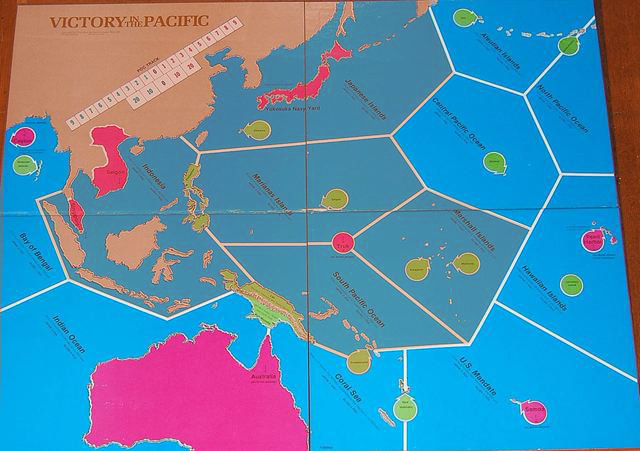
This would be the situation going into June, 1942. The shaded zones are controlled by the Japanese, the lighter areas by the US and her allies. The defensive perimeter is starkly evident this way, along with the one weak area in the strategy: there are two open paths directly to the Home Islands. The first is from the "Hawaiian Islands" area directly through the "Central Pacific"; the other, through the "North Pacific" and "Aleutian Island" zones.
Prior to the Doolittle Raid, there was quite a bit of debate in the Japanese military command as to what the next targets would be... in effect, they had been so successful so quickly, they outstripped their own plans. But then the attack using B-25 medium bombers, flying from the deck of the USS
Hornet, made clear that the Home Islands were still vulnerable, and the plans to attack Midway and the Aleutians were approved. Capturing those "areas" would prevent any attacks to slip through without being discovered and countered, either via ships sailing from Truk or from Japan proper
There was never any plan to use Midway as a point to launch aerial attacks on Pearl Harbor; even for the incredibly long-legged Japanese aircraft, the 1300 mile flight was too far a distance. Instead, it would be a self-defending base able to send reconnaissance flights out to patrol the waters around it. Just
how the Japanese would be able to keep Midway supplied was never really answered; they would figure it out when the time came.
The flaw in this strategy is that the real world isn't a game board with zones of control that prevented enemy movement, yet in effect that's exactly how the Japanese were looking at it. The Pacific Ocean is huge, particularly in the Northern and Central Pacific areas, with vast stretches of open sea where ships could sail without ever being noticed. Indeed, the fleet used in the attack on Pearl Harbor took advantage of this fact on its approach.
The attack on Midway had the goal of sinking the American aircraft carriers, no mistake about it... but defending the Home Islands was the primary goal. That the strategy behind the goal probably wouldn't have worked was apparently never considered.
Posted by: Wonderduck at
07:54 PM
| Comments (16)
| Add Comment
Post contains 676 words, total size 4 kb.
1
Thanks for the response! I also read that the natural resources in the captured territories were insufficient to make up for the embargo from the US - and the Japanese knew it before they started the war. If true, that meant not only did the Japaneses need for America to give up militarily within a year or two, but they also needed the US to "forgive and forget" and lift the trade embargo...
Posted by: Siergen at June 04, 2011 10:45 PM (FiHIo)
2
I don't know that this was really correct. It's true that they never did get the Indonesian oil fields up to the kind of production they really needed, but that wasn't foreseen before the war.
Their biggest problem was shipping, and not just because of the American submarine blockade. They handled their cargo ships suboptimally, because the Navy insisted on owning some of them and the Army did the same, and they didn't really coordinate their usage. So when the Army sent out ships full of troops and supplies to some region, they came back empty instead of bringing back raw materials. When ships were sent out to get raw materials, they went out empty. They could have substantially increased the efficiency of their cargo shipping if only the Army and Navy were more willing to cooperate.
Posted by: Steven Den Beste at June 05, 2011 01:09 AM (+rSRq)
3
It was not simply a misallocation of shipping. Japan, despite having the third largest merchant fleet in the world in size, and the most modern and efficient in quality, did not have enough shipping under the Japanese flag to handle the traffic needed in peacetime, let alone the higher shipping requirements in war. And this does not include the shipping needed for various campaigns (During the later days of the Guadalcanal campaign, the Imperial Army was pressing for major diversion of merchant shipping to support the campaign, despite being told to their face that such diversions were going cripple the overall war effort.) or the requisition of merchant ships for other purposes (Like conversions to escort carriers, minelayers, auxilary cruisers, etc.).
In fact, at the outbreak of the Pacific War, 60-75% of the Japanese merchant fleet had been requisitioned for direct use by the service or in the opening campaigns, leaving very little support the war effort as a whole. For the tanker fleet, it was >80%. No Allied planner would have dared being stupid enough do something anywhere like that.
Posted by: cxt217 at June 05, 2011 02:56 PM (PKA/z)
4
These discussions are interesting but so narrow as to be misleading.
The entire Midway exercise didn't matter...regardless of outcome. The overall outcome was foreordained by the differential in GDP and the resulting delta in war production. While I have some issue with specific entries, this web site is directionally correct ( http://en.wikipedia.org/wiki/Military_production_during_World_War_II  . The war was decided on the size of the prewar industrial base and the ability to ramp. The military efforts were heroic and certainly helpful, but the outcome was decided in the dull, boring (pick your term) factories of domestic USA. The Japanese didn't have even two years...if not for the forced entry into the European conflict, Japan would have been finished years earlier.
. The war was decided on the size of the prewar industrial base and the ability to ramp. The military efforts were heroic and certainly helpful, but the outcome was decided in the dull, boring (pick your term) factories of domestic USA. The Japanese didn't have even two years...if not for the forced entry into the European conflict, Japan would have been finished years earlier.
Japan could not have been certain of simultaneous entry of the US into the European conflict. Any Japanese planning for a short war absent US involvement in Europe was idiocy even if only public source information was available. Note the 1938-1941 difference in GDP between Japan and the USA. The GDP impact is cumulative.
Even if the US had been pushed back to continental US the outcome would have only been worse for the Japanese. In this case, the wars human impact on the US population would have been quite modest and the resurgent economy (due to war production) would have made it 'easy' to stay the course. Imagine a Japan in 1946 that owned the Pacific but was facing a US with long range bombers, scores of carriers and hundreds of nuclear weapons. The post war period saw the development of 700 nuclear bombs by the end of 1950. Imagine a wartime scale up of the nuclear production! Forget Japanese cities....think of Japanese fleet or forward airbase survival in the face of a single bomb that only had to be somewhat close.
After 60 years we should be able to take a step back and understand what really happened. And what was really important.
Posted by: BobReisner at June 07, 2011 02:29 PM (/ZWI/)
5
Bob, none of those things matter if the people of the rich country, or its leaders, don't have the guts to see the thing through.
The Japanese thought that was the case about the Americans. Even if you outproduce your enemy five to one, it still costs blood to win a war, and the Japanese thought that the Americans wouldn't be willing to shed enough blood to win.
That was their plan: after Pearl Harbor, to take and hold so much territory that the butcher's price of taking it back would be so high that the Americans would give up and make terms.
They weren't the first to make that mistake about America, and they weren't the last.
Posted by: Steven Den Beste at June 07, 2011 02:58 PM (+rSRq)
6
Everyone on the Japanese side thought the US would outproduce and outmass them if and when the Pacific War broke out. Everyone. You can argue they underestimated the production imbalance between the themselves and the US, but that is a different matter.
And barring the more extreme delusionists (Gerhard Weinberg in A World At War make for interesting reading on some of the more grandoise schemes of the Axis.), no Japanese thought it was possible to subjugate the US militarily - though quite a few Japanese recognize the US could do so to Japan.
Those were not the points. The Japanese thought they could wear down the Americans' will to continue fighting, that the Americans, confronted with an invincible Germany on the other side of the world (And YES, the Japanese WERE assuming the Germans would play a role against the US - by knocking Britain and the Soviet Union without Japan having to do anything, if nothing else.) would come to terms with Japan that would leave the Japanese in control of a vastly larger empire.
Posted by: cxt217 at June 08, 2011 08:01 AM (PKA/z)
7
I understand the assumption of foreign states of a lack of resolve by American citizens and an expectation of a US citizen desire to end any conflict early and at any cost. I understand this because I see this assumption being made repeatedly over the centuries. But, I also believe the foundation for these assumptions is not scholarship but simply wishful thinking. Any review of American open source history should have warned them otherwise.
American history from the French & Indian War to modern day is a history of substantial citizen minorities acting with incredible violence over protracted time spans. The American Revolution was a long war that was violent and resulted in a significant number of Americans being exiled from their homeland. Modern warfare (WWI & WW2 style) was created by the American Civil War...violent, industrial, encompassing the whole of society, and with little quarter given. If the Civil War was an example of American brother on brother violence, why would any foreign entity expect that the American reaction to foreign assault would be less violent and with less resolve. It was a very indifferent citizenry that was dragged into WW1. But still a speed and size of mobilization that was shocking even to the 'experienced' European warriors. WW1 was a war without real passion on the part of the American citizen, but American history and politics clearly showed that an aroused citizen minority could hold a grudge for a very long time.
While the Japanese right of passage on to the world stage was the war with Russia, could they not have not noticed the American crushing of a similarly waning power, Spain, with even less effort. Could the Japanese not notice that the Depression crushed America, indifferent to foreign affairs, had the blue water navy that they were most concerned about? In 1931 (Depression well underway), the Navy had 3 Carriers, 12 Battleships, 107 Cruisers/Destroyers, and 56 Submarines. On December 7, 1941: 8 Carriers, 17 Battleships, 222 Cruisers/Destroyers and 112 Submarines. ( http://goo.gl/9KAMi ) A Navy of this scope does not happen overnight, it is an activity that takes generations. And the Navy of late 1941 was a product of an economically distressed country under a great measure of political upheaval. It is worth noting that by late 1943 (only 2 years after Pearl Harbor), the US Navy size was greater than the combined fleets of all other countries on the planet. Was their not a single Japanese analyst in the prewar period who could extrapolate existing shipbuilding capacity (1941) to a war time condition and determine that annual ship production was quickly going to be greater than the total Japanese 1941 fleet size.
In an open society there can be significant minorities that will protest for peace visibly and even irrationally. American history shows that the 'war like' minority always holds sway and, while there can be noise, the ability of the American government to mobilize huge armed forces and the supporting industrial society for long periods and across varying economic conditions is always the case. Perhaps our enemies are distracted by our discordant environment, something that doesn't exist in closed monolithic societies. But it doesn't matter. In matters of life and death, our enemies are under a societal obligation to develop the analytical resources that can see past the noise to the true conditions. They never do and are doomed to make unfounded assumptions that cause their societies to collapse. The information to make a correct assessment about American capacity and 'will' were in the open and available to the Japanese (Yamamoto knew). The "Two Oceans Navy Bill" (July 1940) authorized 1.3MM tons of new warships, the 1939 Industrial Mobilization Plan gave the world notice of massive mobilization, in May 1940 the Office for Emergency Management and National Defense Advisory Commission were created to accelerate war planning, and in January 1941 things really started rolling with the new Office of Production management --- years before open hostilities, the American society was years into a long term commitment to war. All in the open. For anyone to see.
It was over before it started. Midway didn't matter. The Japanese had many better options and would have likely pursued them had they had a rigorous analysis of the American reality, economic and strength of will.
Posted by: BobReisner at June 08, 2011 11:08 AM (/ZWI/)
8
You make a lot of good points, Bob, and we can agree to the preposition that any war started by Germany and Japan against the Allies was ultimately doomed to defeat (Though it was not apparent to all the participants at the time.).
But in many ways, it did not matter. Both the Japanese and the Germans knew that once America entered the war, they would be outproduced - heck, the British outproduced Germany in ships, aircraft, and tanks by themselves. And the Japanese were under no illusions about the possible size of the US Navy after the Two Ocean Navy bill/Stark Plan.
But it was the Japanese' consideration about whether the US had the will to fight them - especially with a victorious and apparently invincible Germany waging war against them at the same time - that represented their thinking. That actually has some validity to it, since as Richard Franks pointed out in Guadalcanal, the Japanese had gotten a pretty sense of the domestic mood within the US in 1930s and 40s, including how the Selective Service was renewed by a margin of a single vote in the House. Any doubts about both American and Western will to fight was shared, in private, by none other than Winston Churchill, following the fall of Singapore and Tobruk. And the willingness of the Japanese to fight and die to literally the last man, and how that would impact American preceptions - that was what the Japanese expected before the war which did cause American concern during the war.
The huge productive advantage the US had is what caused the Japanese to plan on a short, decisive war of conquest before coming to terms with US - similar to how the mighty hosts of her surrounding enemies had caused two generations of the German General Staff to plan for a short, decisive war to knock out their opponents in sequence before they could be fully mobilized and act in concert. Given the Japanese' apprisal of American opinion and the massive increase in US naval strength that was coming, that seemed a workable strategy to them. The fact it was myopic is correct but in many ways, irrelevent.
Posted by: cxt217 at June 08, 2011 10:33 PM (PKA/z)
9
So the japanese believed they would win. What if Japan would never have attacked Pearl Harbor, what if they had left US alone and concentrated on carving a huge empire from China, Soviets and european colonial possessions? Would US have done anything? What could have been the triggering point?
Posted by: Ari at June 09, 2011 01:22 AM (QXAzG)
10
The problem is that Japan wasn't completely independent of the US. They required significant shipments of raw materials, including a lot of scrap steel, in order to keep their economy going.
One of the triggers that prompted Pearl was the suspension of oil and steel exports to Japan in mid- to late 1941, in response to their continued invasion of China. Once they were in that position, they couldn't just coast along as they were; access to oil was absolutely required in order to continue with the military obligations they had and the civilian economy. So they had to get access to oil, and that either meant moving against SE Asia or backing down in China.
It's extremely questionable whether backing down in China was actually an option. Any civilian government that tried it without the military would have immediately been turfed out - the Japanese system required the army and the navy to provide a minister each, and they could undo a government by refusing to do so. On top of that, anyone who advocated such a policy would have been highly likely to be assassinated.
Could Japan JUST have attacked SE Asia without the US? Eh. It's not impossible. But if the US decided to make a point of it, it would have been easy to base the fleet at Manila, and there wasn't any way to run oil tanker convoys past a hostile Philippines. So they ran the risk of being pulled into war under circumstances that would have been much more favorable to the US, while still being at risk of getting fuel-choked at any time.
Posted by: Avatar_exADV at June 09, 2011 12:37 PM (44ahZ)
11
I intend to post a response to Bob tonight. It will come as no surprise that I strongly disagree with his initial statements.
Posted by: Wonderduck at June 09, 2011 12:57 PM (OS+Cr)
12
Avatar: I would argue that a Japan that avoided war with the US and only attacked British and Dutch interest would have gotten away with it, at least for a little while. They had two domestic US factors going for them - the strongly isolationist mood of the US population at the time, and intention of FDR to go to war with Germany first while trying to maintain peace as long as possible with Japan. A US public that saw the Japanese avoid attacking American interests (In the Philippines and elsewhere.) and avoid attacking Pearl Harbor, would not have been in a mood to declare war on a Japan that was overrunning Malaya and the Dutch East Indies.
Furthermore, the Philippines were not logistically prepared for a large American force to be based on - primarily because of its vulnerability to being attacked by the Japanese. The ability of a December 1941 Pacific Fleet to do so was also questionable, given the priorities and allocations of forces to the Atlantic and against Germany - something that frustrated Husband Kimmel and his staff to no end.
Posted by: cxt217 at June 09, 2011 02:23 PM (PKA/z)
13
cxt217 in #12 get's it exactly right. By late 1941, the US had clearly decided that Germany was the opponent of choice. A relatively small island nation that knew it's limitations would have seen a path to real victory as anything other than an attack on the US. A treaty that limited China area conquests to Korea, Manchuria and northern China would have taken 'China' off the table and the American population would have lost total interest. Since France and the Netherlands had been conquered by Germany, Japanese protection in force of these and also German assets in the pacific would have likely been welcomed. Think of Japan assuming the role of a limited regional power that allowed the US and Britain to focus on the European/Mideast/Africa theaters. Japan could have easily positioned itself as an ally. An ally that would have been welcomed and whose activities to 'keep the neighborhood safe' would have been overlooked (think about treatment of Russia). It would have taken generations to integrate the arc from Indonesia to Manchuria into a real East Asia co-prosperity sphere, by 1941 japan had conquered almost all it really needed to be strong for the next 100 years. And it would have had some very appealing post war geopolitical considerations...a strong ally aligned against a weak China (likely communist) and a resurgent Russia. A very different Pacific and maybe a very different world picture with Russia having a heavily militarized Japan on the ground in Asia just below the empty Siberia.
Avatar in #10's point about a base in Manila is a stretch. A fleet would be hard to supply and Manila would be vulnerable to submarine blockage and air attack from Formosa. Plus what cxt217 said in #12. A smart Japan could publicize American attacks on still 'friendly' Japanese shipping and it would be extremely difficult for an America at war with Germany to get popular support for an attack on the Japanese fleet. Again, the only thing Japan had to do was to go out of the way to NEVER declare war on the US and to never engage in a first strike. Germany was at war with Britain for 2 years without the US stepping in as a declared partner of Britain. Yes we defended convoys, took some aggressive actions in the Atlantic and beefed up western hemisphere defense but we did not engage Germany despite provocation. Based on this example, why did Japan think the US would actively engage Japan in defense of Britain in the face of Japanese aggression against British conquests. Just another case of bad analysis and bad thinking.
Again on Avatar #10, I think the issue of US oil and scrap steel export to Japan (or rather lack of export) was not really important. Any war with the US would be the same as the export ban....nothing would come from the US to Japan with a state of war in place.
But Avatar in #10 makes my case exactly when he states the very true statement that NO Japanese government would have survived a China retrenchment or likely any military stand down / stabilization. The combination of an insular society, emperor worship and the blind desire for territorial conquest created the perfect storm to assure that all problems had the same answer of military expansion. Post war documents clearly showed that Japan had no realistic plan to stop and that there was no real post war plan, plan to end hostilities or even to 'integrate' the conquests into a rational economic system. True analysis and realistic selection of realistic options was not possible in the religious and political structure that was Japan. The choices made were to recover from ethnic/societal slights and feed the military desire to acquire territory. What other possible explanation could there be for so many bad strategic decisions. It wasn't random bad luck. Ari's point in #9 is so obvious, how could the smartest people in Japan 1941 missed that train of thought.
The linchpin of the discussion rests on two apparent thoughts about the American people by the Japanese leadership: the Americans didn't have a stomach for a long war and they were too 'soft' to fight a determined enemy. We know that these statements are not true but it is my contention that the Japanese could have determined this in 1941 from a careful reading of public source information and American history. Their (the analysts) desire to support ethnic supremacy, their feeling that other societies were structurally inferior, and that they must provide analysis that supports the predetermined conclusions of the emperor and military caused the Japanese disaster known as WWII. I won't repeat all of the prior points but I want to address some of the examples in #10. A close vote on Selective Service was nothing compared to the draft riots of the civil war (which did not affect the conduct of that war). Again, the American revolution and civil war showed conclusively that Americans would fight each other to the last man! If Andersonville showed how Americans would treat their own, what lesson should Japan have taken away? The American propensity for violence was in every newspaper every day....machine gun toting bank robbers, gangland wars in New York, Chicago and Detroit, UAW and other union organizing activity, veteran pension marches (and the government response), California efforts to restrict 'immigrants' from the mid west, ethnic violence on every group that ever migrated to the US in size (Irish, German, Italian, Jews, Chinese, etc.), and of course White on Black actions. As all of this is compared to the relatively peaceful, very structured, very stable Japanese society, I can only ask: Exactly what information were the Japanese analysts missing? A violent people that could hold grudges across many decades.
I do understand that casual viewing of dissent in American political life (and in America in general) could lead those with limited information and understanding to a conclusion that the American society could not be mobilized for war (despite what happened in the Spanish American War and the BUND rallies in the 30's). I do understand that isolationist marches and vocal 'peace at any price' fringe groups could make an impression of weakness on the ill informed. All white people look and act alike so yes, America should collapse like the French, Poles, Austrians, etc did in the face of German intensity (forgetting that Germans were also 'white'). And Roosevelt and his team didn't know about war and were only interested in the domestic economy. And so on. BUT, the analysts and war planners are not supposed to be casual viewers of limited information. These analysts were expected to be 'the best and brightest'! They should have made the effort to learn and understand. They had 2 decades and no externally imposed resource constraints...one less battleship in a 20 year period would have provided the funds to send hundreds of soon to be senior staffers to the US for a decade to learn about us. Of course, the 'visitors' would be so contaminated by the US that they could never assume a senior analysis position in the Japanese hierarchy!
America is a noisy society with many components wanting isolation and peace at any price. My belief is that America always has a range of opinion and it is a specific vocal minority that carries the day. The guy's with the guns. About 1/3 (an unsupportable guess) of America is deeply 'conservative' and they tend to run the important government agencies (Senate, State, Defense, local governments), banks, industry, religion, and the actual military. While other minorities can have impacts on the edge and minorities overlap, there is a core to the US that has acted in a very predicable way (not necessarily right) since our founding. We see it and others can as well (or should).
It wasn't Midway, just really bad staff work. All the answers were available. There were good choices to be made (from their view). The only impediment was a closed mind. Turns out to have been a pretty big impediment.
Posted by: BobReisner at June 09, 2011 04:35 PM (/ZWI/)
14
Bob, sorry but as much as you have some valid and good points - you are not going to win this argument. Your argument about the Japanese' lack of looking at American history ignores that fact that it was very much the Present America and World of 1940-1941 that was the determining factor in Japan's (And Germany's, to a lesser extent.) decision to go to war, in so far it as the apparent lack of will in Americans to fight a war. The Draft Riots of the Civil War are interesting for a Japanese examining American history - it is also largely irrelevent to determining whether Japan was going to war in 1941. Much, if not most, of the American history you cite as being 'missed' by the Japanese were completely irrelevent to the deliberations at hand.
Also, if we are going to look at American history - how about the fact that Americans previously have seldom enjoy unanimus support in going to war? There are been a large segment in almost every war (Barring WW2 - and that still did not prevent one congresswoman from voting against a declaration of war on Japan.) that believed their fellow Americans were making a grave mistake in going to war against whomever. Sometimes this has led to more active anti-war efforts during the conflict. That would seem to argue that the Japanese assessment of Americans might be correct? Likewise, determining how European countries would react to Germany's invasion of Poland on 1 September 1939, by the using the European history regarding the mood in August 1914 might a tad off.
It is important to read the other guy's history but you have to be careful reading significance into it. Japan's defeat at Midway and in the Pacific War was the outcome of a whole host of factors, some of which no one could anticipate and some which could and should have been anticipated by the people of the time - but your overall position really is not one of them and, in my view, not supportable.
Posted by: cxt217 at June 09, 2011 05:19 PM (PKA/z)
15
Sorry to hear that cxt217 in #14 thinks we are having an arguement....I really do think it is a discussion ;>)
I'm also a poor communicator...most of the comments in #14 I agree with and feel support my point of view!
The Civil War draft riots were brought up as a counterpoint to the comment about the Selective Service Act being passed by a single vote margin and how this shows a reluctant America...that by implication would 'freeze' aggressive action by the government. The riots didn't and a single vote wouldn't. I also think that other countries should look at the long history of a people. Clearly much of France, to pick one example, has been and continues to be influenced by the French revolution, Napoleon, 1870, 1914 and of course WWII. The distant past is important. I believe this is true for most countries European, Asian, etc..and of course the USA.
I'd ask (cxt217) why you think American history in general and my specific references to the violent nature of Americans in the 1930's doesn't serve as an indicator that Americans can be violent (and self organize for violence) and hold grudges for a long period. As well as a multi year defense ramp up being well underway by 1941. cxt217 says "...
how about the fact that Americans previously have seldom enjoy unanimus support in going to war?..." My point exactly! With the possible exception of the Spanish American War (made unanimous by a 'sneak attack'!), the US had a long history of going to War with significant (perhaps majority) dissension. How could the Japanese have missed this?
I'll respond to the third paragraph of #14 in a post on the next thread but my line of discussion is NOT about the Japanese defeat at Midway being "...the outcome of a whole host of factors...". Of course it was. My point was and is that the Battle of Midway, while heroic, was not really important in the outcome of the War. And that with the perspective of 60 years after the fact, we should start to acknowledge this.
(Not having to do with this discussion, the cxt217 comment "... Likewise, determining how European countries would react to Germany's invasion of Poland on 1 September 1939, by the using the European history regarding the mood in August 1914 might a tad off..." seems inappropriate on its face. In 1914 Europe went to war on the basis of an assasination of a single person who wasn't really all that important. So if Europe could go to war over a single death, why not a possibility over a single country? Most historians weren't surprised...the exhaustion of WWI created the anomily of Austria and Czechoslovakia, not the other way around.)
Posted by: BobReisner at June 10, 2011 03:01 PM (/ZWI/)
16
First, I was error when referring to this as an 'argument' the way I did. We are having a discussion - all parties are advancing their arguments (i.e. position.) in the discussion.
The point is that trying to read history as an example what a nation or a people will do later, can be dangerous if you put more significance than the part of history is worth. Yes, America has gone to almost all its wars with large segments of the population dissenting (I would argue even the Spanish-American War qualifies, since there were a number of people, up and including William McKinley, who thought it was very bad idea.) and it has impair but not froze its action. I suppose the Japanese could have read that as warning - but they could also read that any war in 1941 that involved the US would not be whole-heartedly supported by the people, and would have a major segment of the American population seek negotiations and peace as soon as possible, and that the peace movement who not freeze the effort - but it would impair so much that the US government would not able to concentrate its whole attention on the war and would spur the US (Especially faced with an invincible Germany too.) to seek peace with the Japanese.
Note that historically, the US has ended every war prior to 1941 except the Civil War with...a negotiated settlement. And had the stalemate that persisted outside Richmond/Petersburg and Atlanta lasted longer in 1864, we might not have the exception either. That would suggest to a Japanese studying American history that the US would eventually come to the negotiating table with Japan as equals to end the war - after all, Americans always become war weary and want it to end, one or another.
And the build-up of American military power prior to 1941 would have argued for Japan to wage a short, decisive war so everything could be settled before the US could bring its greater production to bear. Actually, that is was brought up by the Japanese in the deliberations on the road to war - and before that as well, because they ALWAYS assumed the US would have the numerical advantage in the correlation of forces and productive capability. And it is strikingly similar to a German General Staff that, understanding their neighbors had the ability to steamroller them when they finished mobilizing and acted in concert, planned to knock them out in sequence before that occurred.
Now, we know the Japanese were concentrating on the Present America and Present World of 1941 when considering going to war with the US. Except for the US military build-up, very little else from American history was relevent to their decision making, though the war weariness/isolationism of the 1920s-1930s was certainly a factor. But even if they did study American history more, it would not have supported your position. No one, least of all me, will argue that past has no effect on the present, behavior or otherwise. But you have to read it with the correct appreciation of its significance.
Finally, my comment about trying to predict the European reaction to the invasion of Poland in 1939 through the lens of a 1914 Europe was actually a callback to an observation by Barbara Tuchman in The Guns of August, where she mentioned that 1914 Europe seemed 'bored of peace' which led them to eagerly marched off to war. You certainly can not say Europe was eager to go to war in 1939 - not even Germany - and thus you can not use that past to explain the present. Those are hardly all the reasons for either war, but it does show that care needs to be taken when examining the events of the present through the filter of the past.
And yes, Midway was important - the Japanese defeat meant the initiative was knocked out of their hands and into the air for anyone to try to grab it. That the Allies only grabbed it when they started the Guadalcanal Campagin does not reduces the importance of Midway.
All other commets will go in Wonderduck's post on the subject.
Posted by: cxt217 at June 10, 2011 08:58 PM (G3oVK)
Hide Comments
| Add Comment
The Brewster Buffalo: Midway's Most Reviled Plane
When one thinks of the Battle of Midway, images of Dauntless dive-bombers plummeting down towards Japanese carriers immediately leap to mind. Or perhaps the tragic story of the massacre of the three torpedo squadrons flying TBD Devastators is the more dramatic, and therefore more memorable, saga. Whatever the military buffs out there think of, it's unlikely that the Brewster F2A Buffalo would get more than a derisive snort, if even that.
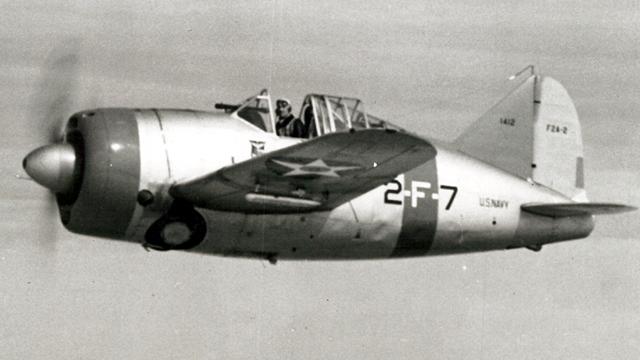
That's somewhat unfair to what was the US Navy's first monoplane fighter. As originally designed, the Buffalo was actually quite nimble and well-liked by its pilots. Indeed, its wing-loading was only slightly higher than that of the Zero. No less a name than Marine pilot Pappy Boyington praised the Buffalo, saying "they were pretty sweet little ships. Not real fast, but the little plane could turn and roll in a phone booth." The most glaring weakness of the F2A was its armament: two machineguns in the nose, one .50cal and one .30cal, a most odd combination. The landing gear was considered marginal for use on carriers, but good enough.
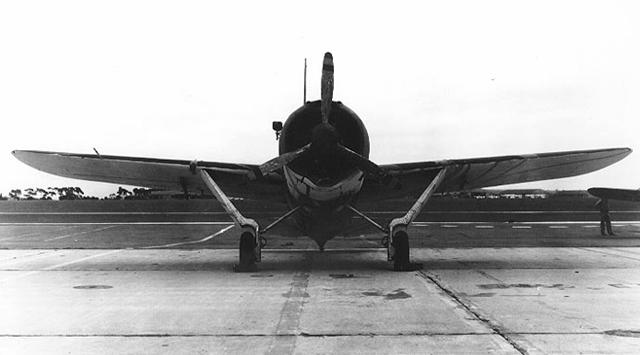
But then the Navy accepted it for service... with a few modifications. Armor plate was added, as was a larger-capacity self-sealing fuel bladder. Further, two wing-mounted .50cal guns were also added... all of this on just a 900hp engine. Performance in the form of top speed and climb suffered badly in a plane not great in either category. By 1941, the Buffalo had turned into the F2A-3, with a 1200hp engine (the benefit of which was mostly lost by the increased weight it added, both in its size and in the larger airframe required to mount it), even more armor, and a bigger wing with integral fuel tanks. This increased the range to nearly 1000 miles, giving it much longer legs than the F4F Wildcat, but ruined the plane's one true feature, its handling.
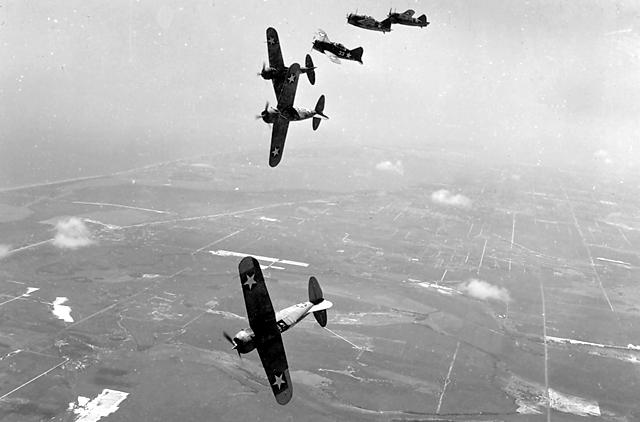
By the Battle of Midway, the Buffalo had become too slow, too heavy and too lethargic, a bad combination for a fighter plane. However, as someone many years later said, "you don't fight wars with the military you want, you fight wars with the military you have," and when the Japanese planes were approaching Midway Atoll, what the defenders had were the 21 Buffalos and seven F4Fs of Marine Fighting Squadron 221.
The result was both better and worse than anybody could have expected. Despite being outnumbered by the 36 Zeros escorting 72 bombers, 17 Japanese planes were shot down by VMF-221, but at the cost of 13 Buffalos and 2 Wildcats (and all of their pilots) lost. Of the remaining planes, only two were still airworthy after the fight. F2A pilots were vociferous in their condemnation of their planes afterwards, one going so far as to state "(the)F2A-3 is not a combat airplane... ...it is my belief that any commander that orders pilots out for combat in a F2A-3 should consider the pilot as lost before leaving the ground."
After the Battle of Midway, all remaining Navy Buffalos were sent to the US mainland as advanced training aircraft, which duty it performed until 1944. Because of the infamous quality that Brewster built their planes with (i.e., none at all), there are only three F2As known to survive.
Outside of the US Navy, however, opinion of the Buffalo is much higher. The British, Australian, Dutch and Finns all used an export variant of the plane. The Finnish Air Force in particular used the B-239E variant to great effect in the air war against the Soviet Union, with one squadron (Lentolaivue 24) registering 459 kills, while losing 15 B-239s. It's notable that these variants did not have the extensive armor plating and heavy self-sealing fuel tanks of the F2A, and therefore kept its maneuverability. To be fair, however, the Finns were not fighting against Zeros flown by crack pilots, but poor Soviet pilots with lousy leadership and, at least at first, obsolete planes.
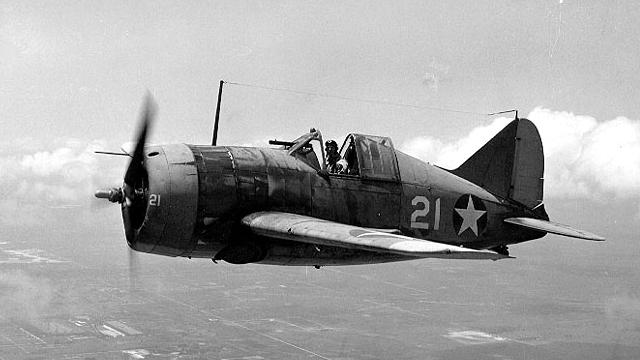
In conclusion, the F2A deserves more respect that it is shown. It was an acceptable enough fighter to begin with, but by the time the Navy was finished throwing stuff into it, it had
become a pig. Consider it a lesson learned, similar to the one the US Army learned with the P-39 Airacobra. That it was outclassed by the Zero isn't a mark of shame;
everything was outclassed by the A6M2 in 1942. Without the Buffalo being present at Midway, the Japanese might have done more damage to the base there. Enough to render it unusable? Probably not, but with the F2A present, they
certainly didn't.
It wasn't a great plane, but it was there.
Posted by: Wonderduck at
03:26 PM
| Comments (3)
| Add Comment
Post contains 779 words, total size 5 kb.
1
The other big problem with the Buffalo seems to be Brewster's inability to produce enough of them fast enough. That meant a lot of the incremental improvements that occurred with other aircraft models produced during WW2 (Which often saw considerable improvements in performance in total.) never happened, because the production run never lasted long enough to do so, even after all the changes insisted by the services using them.
The other big problem which was not exclusive to the Buffalo was that you could not fight the A6M in the kind of low speed, low altitude turning fight it was designed for and which the IJN pilots were trained in. As other pilots learned, you had to fight outside the Zero's performance envelope to engage it on equal footing. The US Navy had started to learn to do so by Midway, the Marine Corps pilots had not. That was true of aircraft with superior handling and performances - the first fighter wing of Spitfires that fought the Zero found this out the hard way, even though the Spitfire was a high performance fighter and the pilots who flew them were very experienced (Most of them were Battle of Britain veterans.).
Posted by: cxt217 at June 04, 2011 07:10 PM (PKA/z)
2
Surprisingly, the F2A
as originally designed probably could have fought in the horizontal, low-speed dogfight the Zero excelled in. True, it was slower by about 20mph, but it would have been nearly as nimble. It would have been outclassed in climb, but it exchange it would have had a better rate of dive. It would have been about even with the
Ki-43 (perhaps better known as the "Oscar", or the Imperial Japanese Army's main fighter plane).
But without armor or self-sealing fuel tanks, it would have been nearly as fragile as the Zero itself... and outgunned and outranged to boot. I doubt the American pilots would have stood for it.
Posted by: Wonderduck at June 04, 2011 08:17 PM (n0k6M)
3
Now that the discussion has started, it makes me what to get out my copy of
The First Team and re-read it to see if John Lundstrom had anything about the F2A.
Posted by: cxt217 at June 04, 2011 09:09 PM (PKA/z)
Hide Comments
| Add Comment
Midway Day 2011
Today, June 4th, is the 69th anniversary of the Battle of Midway. At Naval bases around the world and on board ships at sea, commemorative events have been taking place over the past couple of days, remembering both the Navy's greatest victory and those who lost their lives during the Battle.
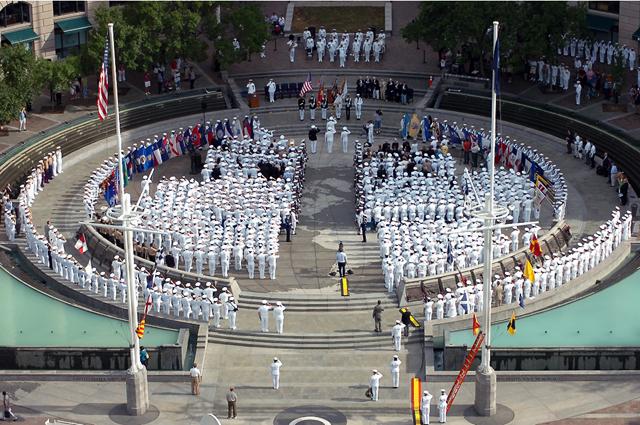
Wreath-laying ceremony at the Navy Memorial, June 3rd, 2011
I should have a post or two up later today on some aspects of the Battle itself. Until then, if you have any questions about the Battle of Midway, feel free to ask and I'll be happy to answer them as best I can.
Posted by: Wonderduck at
07:55 AM
| Comments (6)
| Add Comment
Post contains 107 words, total size 1 kb.
1
Assuming that the Japanese had succeeded in taking Midway, did they have any plans to actually use it, such as for land-based bombing of Pearl harbor? Or was it intended solely as bait to lure the US carriers out and sink them?
Posted by: Siergen at June 04, 2011 01:51 PM (FiHIo)
2
I was ready to respond to that question, but I should wait for Wonderduck's own post.
So I will.
Posted by: Steven Den Beste at June 04, 2011 02:26 PM (+rSRq)
3
From everything that I have read, which includes Tony Tully and John Parshall's Broken Sword, the Japanese did not have any plans for using Midway as a base to launch air attacks on Hawaii. In point of fact, they did not have much idea on what to do with Midway after they had captured it.
Also, it is questionable just how many aircraft could have been based from Midway, especially larger ones. IIRC, what the Americans actually had on Midway was essentially everything they could squeeze onto the island.
Posted by: cxt217 at June 04, 2011 06:59 PM (PKA/z)
4
Well, I just posted my answer at my own blog.
Posted by: Steven Den Beste at June 04, 2011 07:15 PM (+rSRq)
5
Is there actually any plausible way for the japanese to win the war in Pacific?
Posted by: Ari at June 05, 2011 11:21 AM (QXAzG)
6
"Is there actually any plausible way for the japanese to win the war in Pacific?"
Only if U.S. leadership folded which wasn't ever going to happen given the sneak attack on Pearl. To emphasize how foolish the Japanese were was that only 1/3 of America's production was used against the Japanese. Two thirds was for the Germans which were rightly perceived as the greater threat.
The Japanese war plan can be summerized as:
1. Attack Pearl Harbor.
2. ??
3. World domination.

Posted by: TBlakely at June 05, 2011 01:52 PM (S3uDg)
Hide Comments
| Add Comment
146kb generated in CPU 0.0461, elapsed 0.1788 seconds.
56 queries taking 0.1558 seconds, 385 records returned.
Powered by Minx 1.1.6c-pink.

























